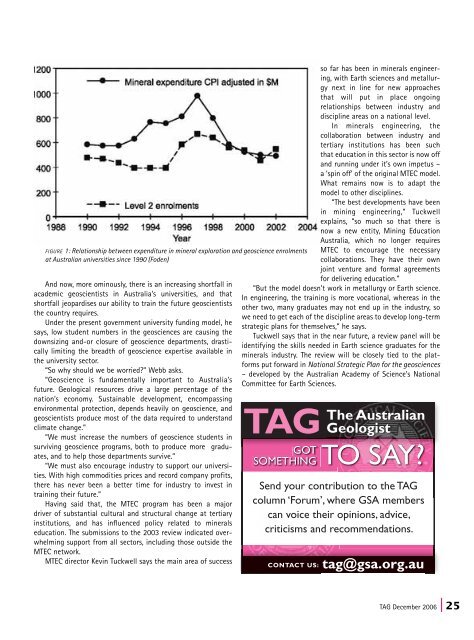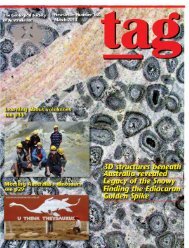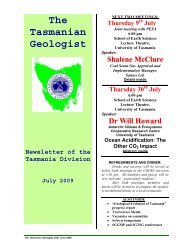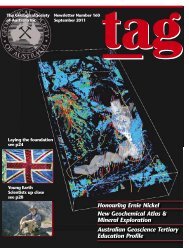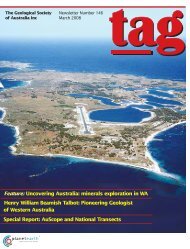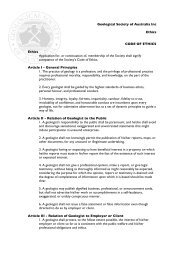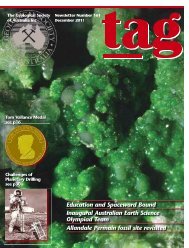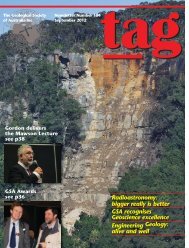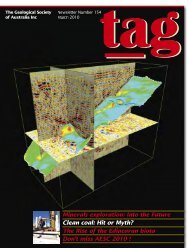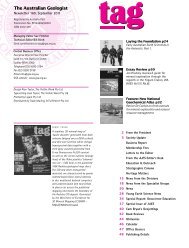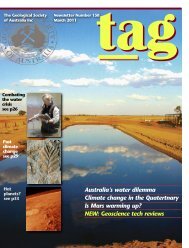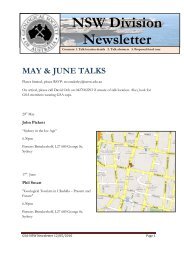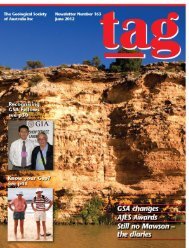The Australian Geologist - Geological Society of Australia
The Australian Geologist - Geological Society of Australia
The Australian Geologist - Geological Society of Australia
Create successful ePaper yourself
Turn your PDF publications into a flip-book with our unique Google optimized e-Paper software.
FIGURE 1: Relationship between expenditure in mineral exploration and geoscience enrolments<br />
at <strong><strong>Australia</strong>n</strong> universities since 1990 (Foden)<br />
And now, more ominously, there is an increasing shortfall in<br />
academic geoscientists in <strong>Australia</strong>’s universities, and that<br />
shortfall jeopardises our ability to train the future geoscientists<br />
the country requires.<br />
Under the present government university funding model, he<br />
says, low student numbers in the geosciences are causing the<br />
downsizing and-or closure <strong>of</strong> geoscience departments, drastically<br />
limiting the breadth <strong>of</strong> geoscience expertise available in<br />
the university sector.<br />
“So why should we be worried” Webb asks.<br />
“Geoscience is fundamentally important to <strong>Australia</strong>’s<br />
future. <strong>Geological</strong> resources drive a large percentage <strong>of</strong> the<br />
nation’s economy. Sustainable development, encompassing<br />
environmental protection, depends heavily on geoscience, and<br />
geoscientists produce most <strong>of</strong> the data required to understand<br />
climate change.”<br />
“We must increase the numbers <strong>of</strong> geoscience students in<br />
surviving geoscience programs, both to produce more graduates,<br />
and to help those departments survive.”<br />
“We must also encourage industry to support our universities.<br />
With high commodities prices and record company pr<strong>of</strong>its,<br />
there has never been a better time for industry to invest in<br />
training their future.”<br />
Having said that, the MTEC program has been a major<br />
driver <strong>of</strong> substantial cultural and structural change at tertiary<br />
institutions, and has influenced policy related to minerals<br />
education. <strong>The</strong> submissions to the 2003 review indicated overwhelming<br />
support from all sectors, including those outside the<br />
MTEC network.<br />
MTEC director Kevin Tuckwell says the main area <strong>of</strong> success<br />
so far has been in minerals engineering,<br />
with Earth sciences and metallurgy<br />
next in line for new approaches<br />
that will put in place ongoing<br />
relationships between industry and<br />
discipline areas on a national level.<br />
In minerals engineering, the<br />
collaboration between industry and<br />
tertiary institutions has been such<br />
that education in this sector is now <strong>of</strong>f<br />
and running under it’s own impetus –<br />
a ‘spin <strong>of</strong>f’ <strong>of</strong> the original MTEC model.<br />
What remains now is to adapt the<br />
model to other disciplines.<br />
“<strong>The</strong> best developments have been<br />
in mining engineering,” Tuckwell<br />
explains, “so much so that there is<br />
now a new entity, Mining Education<br />
<strong>Australia</strong>, which no longer requires<br />
MTEC to encourage the necessary<br />
collaborations. <strong>The</strong>y have their own<br />
joint venture and formal agreements<br />
for delivering education.”<br />
“But the model doesn’t work in metallurgy or Earth science.<br />
In engineering, the training is more vocational, whereas in the<br />
other two, many graduates may not end up in the industry, so<br />
we need to get each <strong>of</strong> the discipline areas to develop long-term<br />
strategic plans for themselves,” he says.<br />
Tuckwell says that in the near future, a review panel will be<br />
identifying the skills needed in Earth science graduates for the<br />
minerals industry. <strong>The</strong> review will be closely tied to the platforms<br />
put forward in National Strategic Plan for the geosciences<br />
– developed by the <strong><strong>Australia</strong>n</strong> Academy <strong>of</strong> Science’s National<br />
Committee for Earth Sciences.<br />
TAG December 2006 | 25


